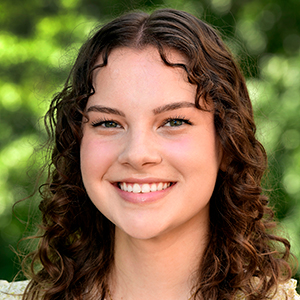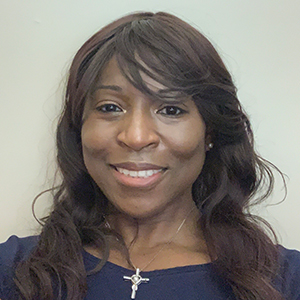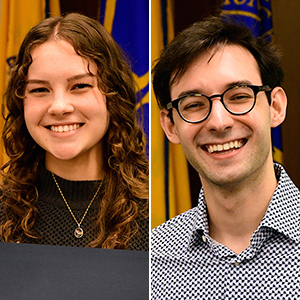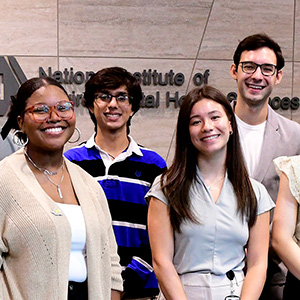Members of the 2020-2021 NIEHS Scholars Connect Program (NSCP) presented their research at the April 16 Spring Symposium. Extraordinary efforts from program coordinators, tremendous support from mentors, and the flexibility of scholars went into revamping the program to allow it to succeed during the pandemic.
NSCP offers a paid internship that provides highly motivated science, technology, engineering, and math-focused undergraduates from underrepresented groups the opportunity for hands-on mentored training in biomedical research. Scholars are matched with NIEHS scientists who guide them through the scientific research process. The training is complemented by activities that support professional development.
The program typically begins with full-time lab work in the summer and continues on a part-time basis through the academic year. However, restrictions put in place to stop the spread of COVID-19 meant this year’s program underwent a radical overhaul.
NSCP redefined
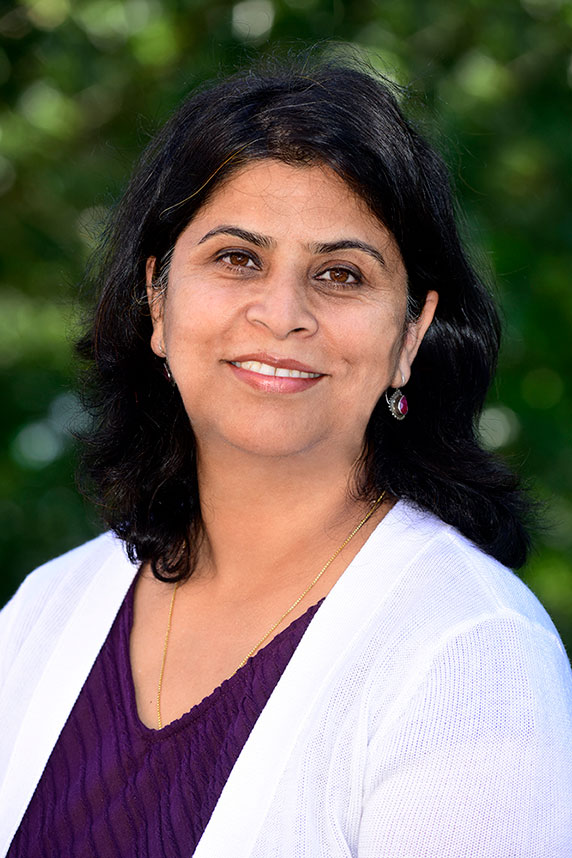 Bhattacharjee is the OSED program manager for undergraduate research training. (Photo courtesy of Steve McCaw)
Bhattacharjee is the OSED program manager for undergraduate research training. (Photo courtesy of Steve McCaw)The 2020-2021 NSCP had a delayed start, and scholars were required to work remotely due pandemic restrictions.
“A lot of planning was needed to make it all happen,” said program coordinator Suchandra Bhattacharjee, Ph.D., “It involved ensuring scholars got the computers and software they needed, adding an additional lab skills boot camp week, adjusting seminar schedules, revising all guidelines, program surveys, and mentor meetings. Furthermore, research projects were modified to meet the virtual format.”
Ericka Reid, Ph.D., directs the Office of Science Education and Diversity (OSED), which offers the program. “We did not want [this year] to be a band-aid kind of program,” she said. “We wanted it to be effective, efficient, and beneficial to everybody that participated, mentors and students.”
Re-imagining professional development
NSCP provides scholars with a comprehensive experience that goes beyond lab work to emphasize skills like effective science communication. “For the past two years, 100% of scholars presented outside NIEHS,” said Bhattacharjee. “This year we could not expect them to have an abstract [ready] in the fall, which is normally the deadline for [conference] submissions.”
Fortunately, some scholars found external opportunities.
- Elinor Shelp-Peck presented her work at the Triangle Consortium for Reproductive Biology conference and the Meredith College Celebrating Student Achievement Day.
- Shama Birla co-authored a poster presented at the 2021 Society of Toxicology conference.
- Ciani Bradley will make a presentation to her St. Augustine’s University research class.
Scholars may return for third connection this summer, because they missed the one last summer. “We’re hoping this cohort of students will present in the upcoming year,” said Bhattacharjee.
A hidden advantage of this year’s unique format may have been increased participation in lab meetings. “I heard from mentors and seminar speakers about scholars actively asking — and answering — questions,” she said.
Independent, critical thinking
The hard work undertaken to overhaul the program paid off. Although most scholars noted that they missed the interaction that in-person attendance would have allowed, they said their confidence, independent and critical thinking skills, and general knowledge about environmental health science were increased.
“Even though the program was entirely virtual, it really helped me grow as a student and scientist,” said Eddy Rios, a senior at the University of North Carolina, Chapel Hill (UNC). “I got to work on developing my communication, intuitiveness, listening, and information digestion skills every week. The internship affirmed that an M.D. is the right path for me and made me excited to pursue medical research in the future.”
OSED will be hosting its tenth group of scholars in 2021-2022, presently with a virtual format in mind.
Scholars hail from six institutions
North Carolina State University (NCSU) chemistry major Louise “Loulou” Batta explored mobile health interventions for changing health behaviors in women of color, supervised by Joan Packenham, Ph.D., from the Division of Intramural Research (DIR). She will study for a Ph.D. at the University of Michigan-Ann Arbor.
Shama Birla, a UNC biology senior, was mentored by Erik Tokar, Ph.D., from the Division of the National Toxicology Program (DNTP). She used cerebral organoids to study arsenic’s developmental neurotoxicity.
Lalith Pereira, Ph.D., from DIR, mentored Ciani Bradley, a biology senior at St. Augustine’s University. Bradley took advantage of existing crystal structures to analyze active sites within DNA polymerases.
Sue Fenton, Ph.D., from DNTP, mentored two scholars.
- Glenn Jackson mined data from population studies to evaluate breast cancer risk. He is a senior biology major at North Carolina A&T University and will pursue a Ph.D. at NCSU.
- Jadesola “Jade’” Oladosu, a pharmacology junior at North Carolina Central University, studied endocrine disruption and mammary gland development after exposure to bisphenol-A (BPA) and substitutes.
Hiromu Koyama evaluated whether hyperpolarization enhances nuclear magnetic resonance analysis of yeast metabolites. The NCSU environmental engineering junior was mentored by Geoff Mueller, Ph.D., from DIR, and Jean Harry, Ph.D., from DNTP. He also conducted research in the NCSU Department of Chemistry with Thomas Theis, Ph.D.
Duke University senior and biology and global health dual major Hongkun (Joy) Lu was mentored by Anton Jetten, Ph.D., from DIR, and Chitrangda Srivastava, Ph.D. Lu studied the role of JAZF1 in diet-induced adiposity. She will return as a National Institutes of Health Postbaccalaureate fellow.
Eddy Rios, a UNC biology senior, was mentored by Linda Yu of a DNTP group led by Darlene Dixon, D.V.M., Ph.D. He focused on developing a new human uterine 3D model for in vitro testing of a BPA derivative, TBBPA. He will attend medical school in the fall.
Elinor Shelp-Peck is a biology and public health junior at Meredith College, mentored by Steve Wu, Ph.D., Sylvia Hewitt, and Francesco DeMayo, Ph.D., from DIR. She profiled over 160 genes involved in decidualization, a process that occurs in the uterus before and during pregnancy.
NCSU junior and genetics and zoology dual major Emma Wallace discussed error rates in DNA replication in Escherichia coli. She was mentored by Roel Schaaper, Ph.D., from DIR.
Chris Williams, an NCSU senior in developmental biology, explored transcriptional effects of chronic low-level exposure to domoic acid, mentored by Jean Harry, Ph.D., of DNTP, and Jian-Liang Li, Ph.D., from DIR. He will attend Boston University for a master’s in clinical research.
(Florencia Pascual, Ph.D., is a contractor in the NIEHS Pediatric Neuroendocrinology Group.)





